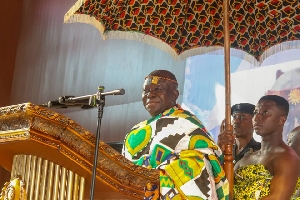Opinions of Monday, 3 May 2010
Columnist: Okoampa-Ahoofe, Kwame
Not So Brilliant, To Tell You The Truth, Mr. Iddrisu!
By Kwame Okoampa-Ahoofe, Jr., Ph.D.
In the wake of an apparent conflict of role between Ghana’s Electoral Commission (EC) and the National Identification Authority (NIA), the country’s Minister of Communications was quoted to be saying that Ghanaian politicians are notorious for being brilliant when they have been shunted to the margins of the political opposition (See “Ghanaian Politicians Are Brilliant In Opposition – Haruna Iddrisu” MyJoyOnline.com 2/8/10).
Actually, Ghanaian politicians are better known for making nuisances of themselves while in opposition. For instance, during most of the 8 years that the National Democratic Congress was both in the parliamentary and executive, or gubernatorial, opposition, then-parliamentary minority leader Mr. Alban S. K. Bagbin spent quite a sizeable chunk of his paid working hours organizing boycotts and protests against parliamentary proceedings. New Patriotic Party parliamentarians were equally guilty of the same sophomoric behavior in turn.
On the question of the apparent rift between the National Identification Authority and the Electoral Commission, the NPP parliamentary leader, Mr. Osei Kyei Mensah-Bonsu, is spot on the mark when the Kumasi-Suame MP opines that resolving the impasse would necessitate the organic and functional coordination of these two statal institutions. Indeed, the National Identification Authority could readily be subsumed under the aegis of the Department/Ministry of Labor, while the Electoral Commission retains its independence as clearly mandated by the Fourth-Republican Constitution. However, in view of the functional overlap between both the NIA and the EC, what could then be done is to have a liaising conduit mediate and/or coordinate the activities of the NIA and EC where the specific question of identity or citizenship and residential determination is concerned.
Still, contrary to Mr. Iddrisu’s rather parochial interpretation of the constitutionally stipulated independence of the Electoral Commission, there appears to be more than one level on which the activities of the NIA and the EC require coordination as, for instance, in the periodic collation of statistical data between the two institutions in order to minimize any discrepancies in recordkeeping where both the voter’s register and census figures are concerned. Needless to say, the Department/Ministry of Labor would have to be charged with the recordkeeping of both actively engaged citizens as well as the unemployed, the superannuated, underemployed and those not registered in any of the above categories. The Births and Deaths Registry could also come under the aegis of the Labor Department/Ministry, if this already happens not to be the case.
What appears to be the greater bone of public contention here, however, is in regard to whether Ghana ought to go biometric or electronic during the 2012 general elections. Ideally, one is readily inclined to concur with the Danquah Institute’s stance regarding the imperative necessity for the Government and the Electoral Commission to promptly implement a biometric system of voting, in order to significantly enhance electoral transparency. The problem here, however, lies somewhere between Mr. Iddrisu’s concern regarding the logistics entailed in such short-order implementation of a biometric voting system, such as erratic power supply, a significant level of functional illiteracy and adequate and conducive voter-education drive.
On the preceding score, what needs to be highlighted is that such an exercise need not occur in one fell swoop, as it were. It is not even ideal or practicable. Instead, what ought to happen is for the Electoral Commission to initiate a pilot biometric voting system come 2012. Such a system could initially be confined to such “enlightened centers” as our major university and college campuses, as well as urban and metropolitan centers with high levels of functionally literate eligible voters. For that matter, one would not wholeheartedly endorse the ultra-conservative stance taken by the Communications minister, to the dubious effect that a full-scale implementation of the biometric voting system ought to be scheduled for the 2016 general election, at the earliest.
Knowing the snail-paced nature of Ghanaian politics, particularly where the ballot is concerned, the sooner such a project got implemented, at least at the piloting level, the better stead it would stand us all against the crippling development of the proverbial cold feet. Then also, there is no guarantee, whatsoever, contrary to what Mr. Iddrisu would have his audience believe that, somehow, by some magical stroke of genius, come 2016, Ghanaians would have long negotiated past the perennial problem of erratic power supply. Nothing could be farther from the truth. And, in fact, if the current reality on the ground is anything to go by, then, Ghanaians are more than likely to experience acute power dearth in the near future, our much-touted petrochemical bonanza notwithstanding.
The also must be squarely and poignantly borne in mind the fact that even in advanced and comfortably stable democracies such as the United States, voting culture and/or protocol is not uniform or homogeneous across the board. Ultimately, the sticky problem of polling irregularities in Ghana has far more to do with a woeful lack of vigilant tough-mindedness on the part of the political underdog – in this instance, the evidently smug, naïve and gun-shy adherents of the Danquah-Busia ideological camp, presently represented by the New Patriotic Party – than mere technology.
*Kwame Okoampa-Ahoofe, Jr., Ph.D., is Associate Professor of English, Journalism and Creative Writing at Nassau Community College of the State University of New York, Garden City. He is a Governing Board Member of the Danquah Institute (DI), the Accra-based pro-democracy policy think tank, and the author of 21 books, including “Sounds of Sirens: Essays in African Politics and Culture” (iUniverse.com, 2004). E-mail: okoampaahoofe@optimum.net.












